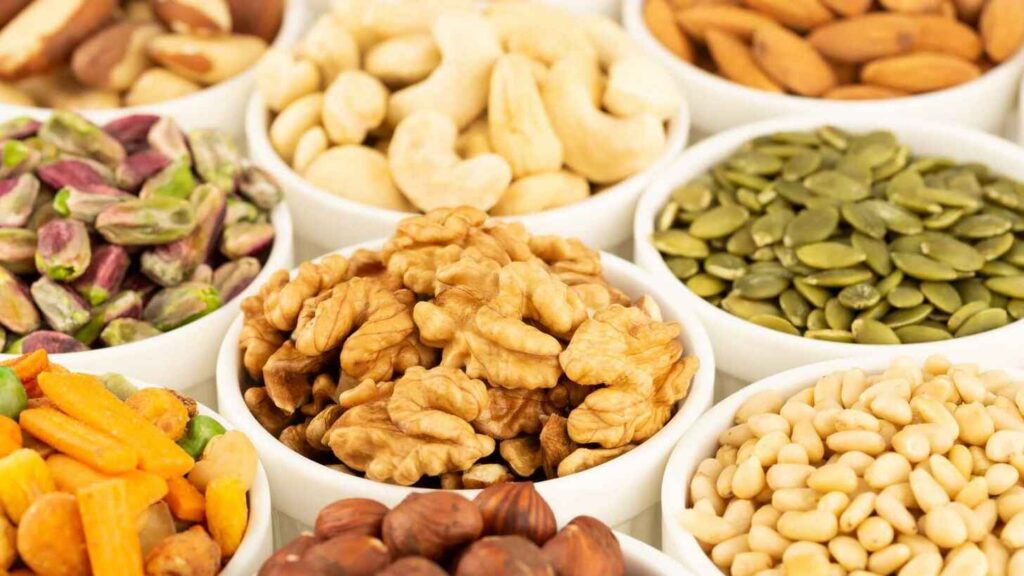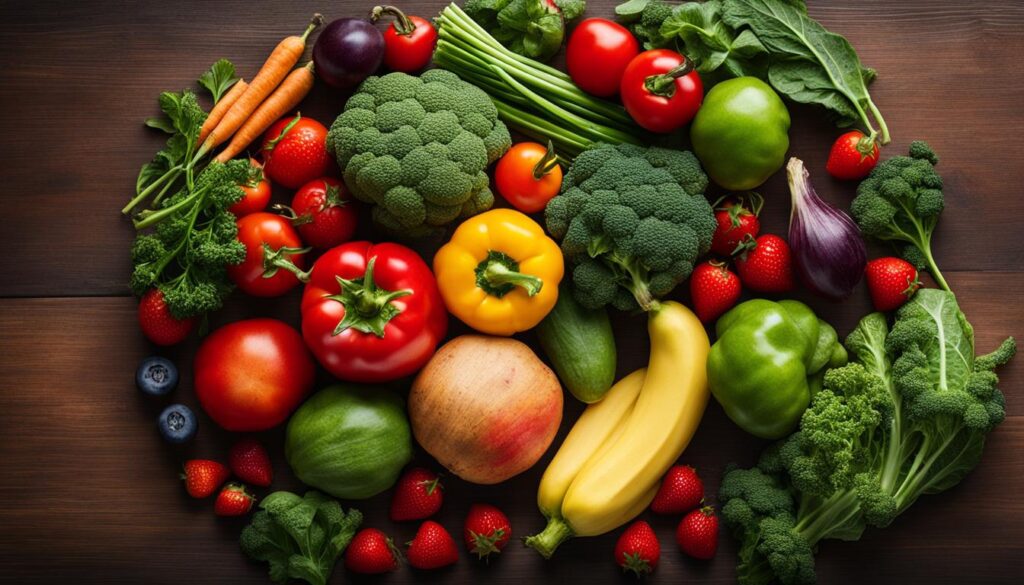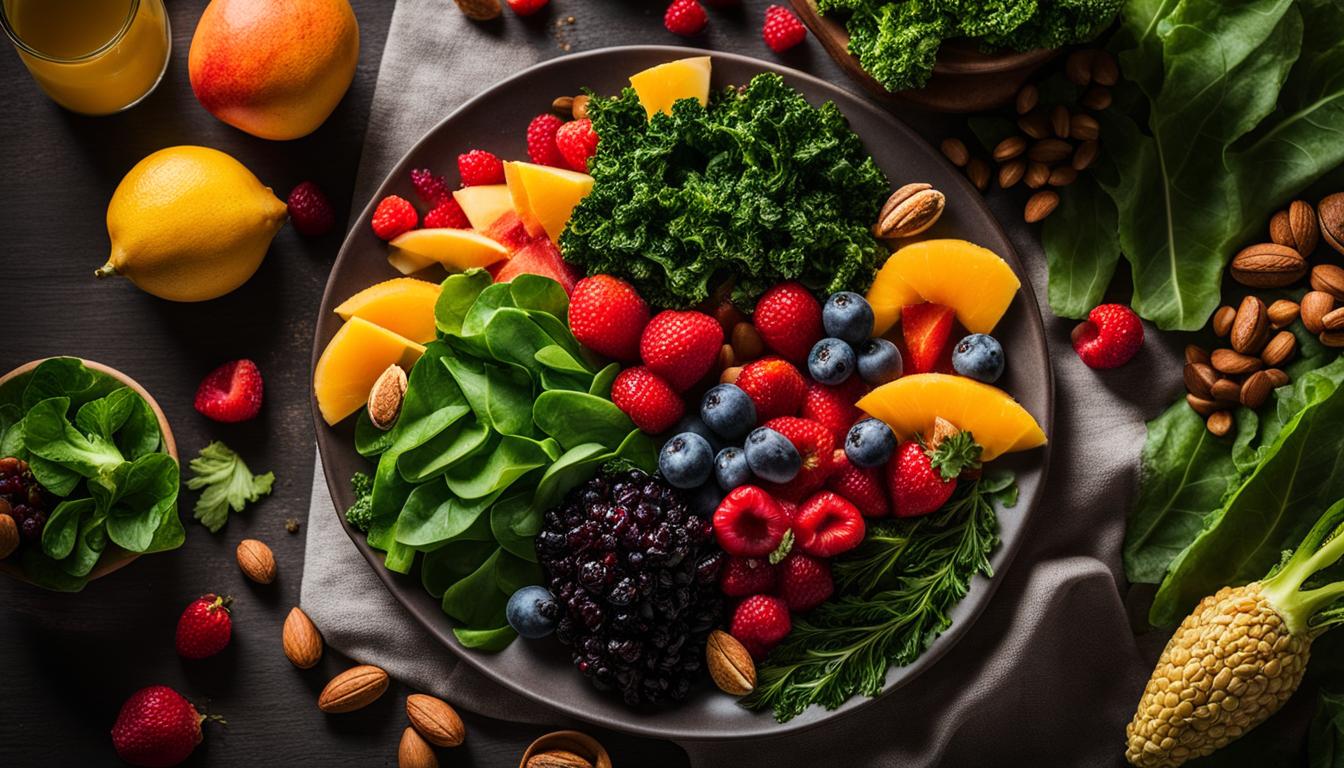Here we discuss about 10 Foods That Reduce Cortisol Naturally. Elevated cortisol levels can have a negative impact on our health, leading to weight gain, high blood pressure, and anxiety. However, there are natural ways to reduce cortisol levels, and incorporating certain foods into our diet can be an effective strategy. In this article, I will explore the top 10 foods that can help reduce cortisol naturally and promote a sense of well-being.
Key Takeaways:
- There are specific foods that have been shown to reduce cortisol levels naturally.
- Incorporating anti-stress foods into your regular diet can be a beneficial long-term strategy for cortisol reduction and stress management.
- Making healthy food choices, such as incorporating the foods mentioned in this article, can support overall well-being and help manage stress.
- A plant-based diet rich in fruits, vegetables, whole grains, legumes, nuts, and seeds can help lower stress hormone levels, including cortisol.
- Diet plays a significant role in the body’s stress response, and certain nutritional strategies, such as consuming foods rich in magnesium and omega-3 fatty acids, can support cortisol control.
Understanding Cortisol and Its Impact on Health
Cortisol is a hormone released by the adrenal glands in response to stress. It plays a crucial role in various bodily processes, including metabolism, immune response, and regulating blood pressure. Understanding cortisol and its effects on health is essential for maintaining overall well-being.
What is Cortisol?
Cortisol, often referred to as the “stress hormone,” is a hormone produced by the adrenal glands. Its primary function is to mobilize the body’s resources during times of stress. Cortisol helps regulate metabolism, blood sugar levels, and immune function. It is crucial for survival and adaptation to stressful situations.
Effects of Elevated Cortisol Levels
While cortisol is necessary for optimal functioning, chronically elevated levels can have detrimental effects on health. Prolonged exposure to high cortisol levels can lead to weight gain, particularly in the abdominal area. Elevated cortisol can also contribute to high blood pressure, impaired immune function, and increased susceptibility to infections.
Furthermore, sustained high cortisol levels have been associated with the development of chronic conditions such as diabetes, cardiovascular disease, and mental health disorders.
The Importance of Controlling Cortisol
Controlling cortisol levels is crucial for maintaining overall health and well-being. When cortisol levels remain elevated for extended periods, it disrupts the body’s natural balance and can lead to various health issues. Managing stress and implementing strategies to lower cortisol levels, including dietary and lifestyle changes, can help reduce the risk of developing chronic conditions and support optimal health.
Plant-Based Foods That Reduce Cortisol Naturally Or Stress Hormone Levels
A plant-based diet rich in fruits, vegetables, whole grains, legumes, nuts, and seeds can help lower stress hormone levels, including cortisol. These foods are packed with beneficial nutrients like antioxidants, vitamins, and minerals that support the body’s stress response and promote relaxation. Incorporating a variety of plant-based foods into your diet can provide numerous health benefits and play a role in reducing cortisol naturally.
When it comes to reducing stress hormone levels, plant-based foods offer a wide range of options. Fruits and vegetables, such as berries, leafy greens, and avocados, are particularly beneficial due to their high levels of antioxidants and vitamins. Whole grains like quinoa and brown rice provide complex carbohydrates that help regulate cortisol levels by stabilizing blood sugar.
Legumes like chickpeas and lentils are excellent sources of protein and fiber, which can help regulate stress hormone levels and promote a feeling of fullness. Nuts and seeds, such as almonds, walnuts, and chia seeds, are packed with healthy fats and omega-3 fatty acids, both of which have been shown to lower cortisol levels.
The table below provides a comprehensive list of plant-based foods that can help reduce stress hormone levels:
| Food | Nutritional Benefits |
|---|---|
| Avocados | High in healthy fats and B vitamins |
| Berries | Loaded with antioxidants and vitamin C |
| Leafy Greens | Rich in magnesium and other stress-reducing nutrients |
| Quinoa | Provides complex carbohydrates and essential amino acids |
| Chickpeas | High in protein and fiber |
| Almonds | Rich in healthy fats and vitamin E |
| Walnuts | Contain omega-3 fatty acids and antioxidants |
| Chia Seeds | Loaded with omega-3s, fiber, and protein |
By incorporating these plant-based foods into your diet, you can provide your body with the necessary nutrients to support a healthy stress response and lower cortisol levels naturally. Plus, these foods offer additional benefits for overall well-being, such as improved digestion, heart health, and weight management.
Remember, a plant-based diet doesn’t have to be restrictive or boring. With a variety of fruits, vegetables, grains, legumes, nuts, and seeds to choose from, you can create delicious and satisfying meals that promote stress reduction and overall health.
How Diet Affects Your Stress Response
Your diet plays a significant role in your body’s stress response, and adopting specific nutritional strategies can help control cortisol levels, the primary stress hormone. By incorporating a cortisol-reducing diet into your lifestyle, you can effectively manage stress and promote overall well-being.
Nutritional Strategies for Cortisol Control
When it comes to managing cortisol levels, certain nutritional strategies can make a difference. Consuming a well-balanced diet that includes a variety of nutrient-rich foods can support stress management and help lower cortisol levels. Here are some key strategies to consider:
- Focus on whole foods: Choose whole grains, lean proteins, and plenty of fruits and vegetables to provide essential nutrients and support a healthy stress response.
- Adequate protein intake: Including sources of high-quality protein like fish, poultry, beans, and tofu can help regulate cortisol levels and promote muscle recovery.
- Avoid processed foods and sugary snacks: These foods can lead to blood sugar spikes and cause stress on the body. Opt for whole, unprocessed foods instead.
- Hydrate properly: Dehydration can increase stress levels, so make sure to drink enough water throughout the day to stay properly hydrated.
The Role of Magnesium and Omega-3s
Specific nutrients have been found to play a significant role in cortisol regulation and stress management. Two key nutrients to focus on are magnesium and omega-3 fatty acids.
Magnesium is known for its calming properties and its ability to regulate the body’s stress response. Foods rich in magnesium, such as leafy greens, nuts, seeds, and whole grains, can help lower cortisol levels and promote a sense of calm.
Omega-3 fatty acids, found in Flaxseeds, Hemp seeds, Canola oil, Soybeans, walnuts and chia seeds, have been shown to have anti-inflammatory properties that can reduce cortisol production. Including these omega-3-rich foods in your diet can help support a healthy stress response and overall well-being.
The Connection Between Omega-3 Fatty Acids and Cortisol Reduction
Omega-3 fatty acids are known for their numerous health benefits, including their potential to reduce cortisol levels. These essential fatty acids have been shown to have anti-inflammatory properties, which contribute to their cortisol-reducing effects. Incorporating omega-3-rich foods into your diet can help lower cortisol and promote a healthy stress response.
If you follow a plant-based diet, you can still obtain omega-3s from plant-based sources such as chia seeds and flaxseeds, which are rich in alpha-linolenic acid (ALA), a type of omega-3 fatty acid.
Research has suggested that omega-3 fatty acids can help regulate cortisol production and counteract the negative effects of chronic stress. By including omega-3s in your diet, you can support your body in managing cortisol levels and promoting overall well-being.
To visually demonstrate the connection between omega-3 fatty acids and cortisol reduction, take a look at the following table:
| Foods | Omega-3 Fatty Acid Content (per serving) |
|---|---|
| Hemp Seeds | Approximately 1 g per tablespoon. They also have a complete protein profile, meaning they contain all nine essential amino acids. You can blend hemp seeds into your milk, smoothies, or sauces, or sprinkle them on your salads or bowls. |
| Chia Seeds | Approximately 5 grams of ALA omega-3 fatty acids |
| Flaxseeds | Approximately 2 grams of ALA omega-3 fatty acids |
By incorporating these omega-3-rich foods into your regular diet, you can take advantage of their cortisol-reducing properties and support your body’s stress response. Whether you choose to consume fatty fish or opt for plant-based sources, adding omega-3 fatty acids to your meals is an effective way to naturally lower cortisol and promote a healthy balance.

Foods That Reduce Cortisol Naturally
To effectively reduce cortisol levels and manage stress, incorporating specific foods into your diet can be highly beneficial. These cortisol-lowering foods not only provide essential nutrients but also have properties that promote relaxation and combat the effects of cortisol. Let’s explore three key foods that can naturally reduce cortisol levels:
Avocados: A Superfood for Stress Relief
Avocados are a powerhouse when it comes to stress relief. Rich in healthy fats, vitamins, and minerals, avocados provide essential nutrients that support the body’s stress response. The monounsaturated fats in avocados help stabilize blood sugar levels, which can prevent spikes in cortisol. Additionally, avocados are a good source of B vitamins, which play a crucial role in maintaining a healthy nervous system and promoting relaxation.
Berries: Antioxidant-Rich Cortisol Combatants
Berries are not only delicious but also packed with powerful antioxidants that combat the effects of cortisol. The antioxidants in berries help protect the body against oxidative stress caused by high cortisol levels, reducing inflammation and promoting a sense of calm. Blueberries, strawberries, and raspberries are particularly rich in vitamin C, which has been shown to lower cortisol levels. Including a variety of berries in your diet can be an effective strategy for reducing stress and its negative impact on the body.
Leafy Greens: Magnesium-Packed Calm-Inducers
Leafy greens like spinach, kale, and Swiss chard are excellent sources of magnesium, a mineral known for its calming properties. Magnesium helps regulate cortisol levels and promotes a sense of calm and relaxation. When cortisol levels are elevated, magnesium can help alleviate anxiety and stress. Make sure to incorporate a variety of leafy greens into your meals to ensure an adequate intake of this essential mineral.
By including these foods in your diet, you can naturally reduce cortisol levels and support your overall well-being. Avocados, berries, and leafy greens offer a combination of nutrients, antioxidants, and minerals that not only lower cortisol but also provide numerous other health benefits. Start incorporating these stress-reducing foods into your meals and experience the positive effects on your mind and body.
Probiotics and Their Role in Hormonal Balance
– Probiotics play a crucial role in hormonal balance, including the regulation of cortisol levels. These beneficial bacteria can have a positive impact on the gut-brain axis, influencing cortisol production and stress response.
– The gut-brain axis is a bidirectional communication network between the gut and the brain. It involves complex interactions between the gut microbiome, neurotransmitters, and hormonal signaling. Imbalances in this axis can contribute to cortisol dysregulation and affect mental well-being.
– Consuming fermented foods that are rich in probiotics can promote a healthy gut microbiome and support hormonal balance. Some examples of fermented foods include yogurt, kefir, sauerkraut, and kimchi. These foods can help regulate cortisol levels, enhance the body’s stress response, and improve mental well-being.
The Gut-Brain Axis and Cortisol Levels
– The gut and the brain are interconnected through a complex system of nerves, hormones, and biochemical signaling. This communication pathway, known as the gut-brain axis, plays a crucial role in regulating cortisol levels.
– The gut microbiome, which consists of trillions of microorganisms residing in the digestive tract, influences the production of neurotransmitters and stress hormones like cortisol. An imbalance in the gut microbiome can disrupt cortisol regulation and impact overall hormonal balance.
– By maintaining a healthy gut microbiome through the consumption of probiotic-rich foods, you can support the gut-brain axis and promote optimal cortisol levels. This can have a positive impact on both physical and mental well-being.
Fermented Foods for Mental Well-being
– Fermented foods are a valuable source of probiotics and can contribute to optimal mental well-being. These foods undergo a natural fermentation process that enhances their nutritional content and promotes the growth of beneficial bacteria.
– The probiotics found in fermented foods can modulate gut health, reduce inflammation, and influence neurotransmitters that impact mood and stress response, including cortisol. By incorporating fermented foods into your diet, you can support a healthy gut microbiome, regulate cortisol levels, and improve mental well-being.
– Some popular fermented foods include yogurt, kefir, kombucha, sauerkraut, tempeh, and miso. Experiment with incorporating these foods into your meals and snacks to reap the potential benefits for your hormonal balance and mental well-being.
Implementing a structured approach to cortisol reduction through probiotics and fermented foods can be a valuable strategy for maintaining hormonal balance and promoting optimal mental well-being. By understanding the gut-brain axis and incorporating probiotic-rich fermented foods into your diet, you can support the regulation of cortisol levels and improve your overall health.
Anti-Inflammatory and Antioxidant Foods That Lower Cortisol and Inflammation
Inflammation and cortisol production are closely linked, but incorporating anti-inflammatory and antioxidant-rich foods into your diet can help lower cortisol levels and reduce inflammation. These foods contain beneficial compounds that can combat oxidative stress and promote a healthy stress response.
One powerful anti-inflammatory spice is turmeric. Its active component, curcumin, has been shown to decrease inflammation and inhibit cortisol production. Adding turmeric to your meals or enjoying a cup of turmeric tea can provide these benefits.
Ginger is another potent anti-inflammatory food. It contains gingerol, which has been found to reduce inflammation and suppress cortisol synthesis. Incorporating fresh ginger into your cooking or enjoying a cup of ginger tea can help lower cortisol levels.

Green tea is rich in antioxidants called catechins, which have been shown to reduce inflammation and lower cortisol levels. Enjoying a cup of green tea daily can provide anti-inflammatory benefits and promote a sense of calm.
Dark chocolate is not only delicious but also has anti-inflammatory properties. It contains flavonoids that can reduce inflammation and lower cortisol levels. Opt for dark chocolate with a high percentage of cocoa for the most benefits.
Incorporating fruits and vegetables that are high in antioxidants can also help lower cortisol and reduce inflammation. Examples include berries, such as blueberries and strawberries, which are packed with antioxidants. Other antioxidant-rich choices include leafy greens like spinach and kale, as well as colorful fruits like oranges and cherries.
By including these anti-inflammatory and antioxidant foods in your diet, you can help combat inflammation and promote a healthy stress response by lowering cortisol levels.
Smart Addition of Herbs and Spices in a Cortisol-Reducing Diet
Adding certain herbs and spices to your diet can enhance the cortisol-reducing effects of your meals. These natural ingredients not only add flavor to your dishes but also provide additional health benefits that promote a balanced cortisol level and overall well-being.
Curcumin: The Potent Turmeric Extract
Curcumin, a compound found in turmeric, is known for its potent anti-inflammatory properties. It has been widely studied for its ability to balance cortisol levels and reduce inflammation in the body. Including turmeric in your meals or taking curcumin supplements can be an effective way to support a healthy stress response and lower cortisol naturally.
Cinnamon: The Sweet Spice That Helps Balance Cortisol
Cinnamon is a delicious and aromatic spice that not only adds a unique flavor to your dishes but also helps balance cortisol levels. Research has shown that cinnamon can regulate cortisol and promote a healthy stress response. Sprinkle some cinnamon onto your oatmeal, add it to your morning coffee, or incorporate it into your baked goods for a tasty way to reduce cortisol naturally.
Adaptogenic Herbs: Nature’s Stress Relievers
Adaptogenic herbs are powerful plants that have been used for centuries in traditional medicine to help the body adapt to stress and reduce cortisol levels. Two popular adaptogenic herbs known for their stress-relieving properties are ashwagandha and rhodiola. Ashwagandha is believed to support adrenal function and promote a sense of calm, while Rhodiola is known for its fatigue-fighting and mood-enhancing effects. Adding these herbs to your diet, either in powdered form or as a supplement, can provide additional support for cortisol reduction and stress management.
By incorporating these herbs and spices into your cortisol-reducing diet, you can take a holistic approach to managing stress and promoting a healthier lifestyle.
Conclusion
Incorporating anti-stress foods into your regular diet can be a beneficial long-term strategy for cortisol reduction and stress management. By making healthy food choices and including cortisol-reducing foods, you can support overall well-being and effectively manage stress.
Integrating these foods doesn’t have to be complicated. Start by incorporating avocados, berries, and leafy greens into your meals. Avocados provide a rich source of healthy fats, vitamins, and minerals, which contribute to stress relief. Berries are packed with antioxidants that combat the effects of cortisol and promote relaxation. And leafy greens like spinach and kale are magnesium-packed calm-inducers that help regulate cortisol levels and induce a sense of calm.
Remember that maintaining a healthy diet is just one part of a comprehensive stress management plan. It’s important to also prioritize other aspects of self-care, such as regular physical activity, sufficient sleep, and stress-reducing activities like meditation or yoga. By taking a proactive approach to managing stress and promoting a healthier lifestyle, you can improve your overall well-being and effectively reduce cortisol levels in the long run.
FAQ
What is cortisol?
Cortisol is a hormone released by the adrenal glands in response to stress. It plays a role in various bodily processes, including metabolism, immune response, and regulating blood pressure.
What are the effects of elevated cortisol levels?
Elevated cortisol levels can have detrimental effects on health, such as weight gain, high blood pressure, and impaired immune function. Prolonged exposure to high cortisol levels can also contribute to chronic conditions like diabetes, cardiovascular disease, and mental health disorders.
Why is it important to control cortisol?
It is important to control cortisol levels to maintain overall health and well-being. Prolonged elevation of cortisol can lead to various health issues and chronic conditions.
Can a plant-based diet help lower stress hormone levels?
Yes, a plant-based diet rich in fruits, vegetables, whole grains, legumes, nuts, and seeds can help lower stress hormone levels, including cortisol. These foods are packed with beneficial nutrients like antioxidants, vitamins, and minerals that support the body’s stress response and promote relaxation.
How does diet affect your stress response?
Your diet plays a significant role in your body’s stress response. Consuming a balanced diet that includes foods rich in magnesium and omega-3 fatty acids can support stress management and lower cortisol levels. Magnesium helps regulate the body’s stress response, while omega-3s have anti-inflammatory properties that can reduce cortisol production.
What foods can help reduce cortisol naturally?
Foods that can help reduce cortisol naturally include avocados, berries, leafy greens, fermented foods with probiotics, anti-inflammatory and antioxidant-rich foods like turmeric, ginger, green tea, and dark chocolate, as well as herbs and spices like curcumin, cinnamon, and adaptogenic herbs.
What role do probiotics play in cortisol regulation?
Probiotics play a crucial role in hormonal balance, including the regulation of cortisol levels. They promote a healthy gut microbiome and support mental well-being by regulating cortisol levels.
Can anti-inflammatory and antioxidant-rich foods help lower cortisol?
Yes, consuming anti-inflammatory and antioxidant-rich foods can help lower cortisol and reduce inflammation. Foods like turmeric, ginger, green tea, dark chocolate, and certain fruits and vegetables are known for their anti-inflammatory and antioxidant properties.
How can herbs and spices help in reducing cortisol?
Adding certain herbs and spices to your diet can enhance the cortisol-reducing effects of your meals. Curcumin, found in turmeric, has potent anti-inflammatory properties and can help balance cortisol levels. Cinnamon can aid in cortisol regulation, and adaptogenic herbs like ashwagandha and rhodiola are known for their stress-relieving properties.
How can I integrate anti-stress foods into my regular diet?
Integrating anti-stress foods into your regular diet can be a beneficial long-term strategy for cortisol reduction and stress management. By making healthy food choices and incorporating the foods mentioned in this article, you can support your overall well-being and manage stress more effectively.




